Privatisation of Military Force: Pros, Cons, and Political Impact
VerifiedAdded on 2020/03/16
|37
|8704
|88
Report
AI Summary
This report delves into the multifaceted topic of military force privatisation, examining its global implications within the realm of international relations. It begins by identifying the research problem, outlining aims, objectives, and research questions concerning the advantages and disadvantages of privatizing security forces. A comprehensive literature review explores the concept of privatisation, its effect on state control, and the support and criticism it receives. The methodology section details the research approach, data collection methods, and analysis techniques employed. The data findings and analysis chapter presents thematic analysis, illustrated with tables and examples, highlighting the benefits and consequences of privatised security forces. The report concludes with recommendations for states, addressing the challenges and opportunities presented by the privatisation of military force. The study highlights the growth of private security companies, particularly in the US and certain African countries, and their role in conflicts and political changes. It also considers the ethical and practical issues, such as transparency, accountability, and the potential for information leaks, associated with the privatisation of military functions.
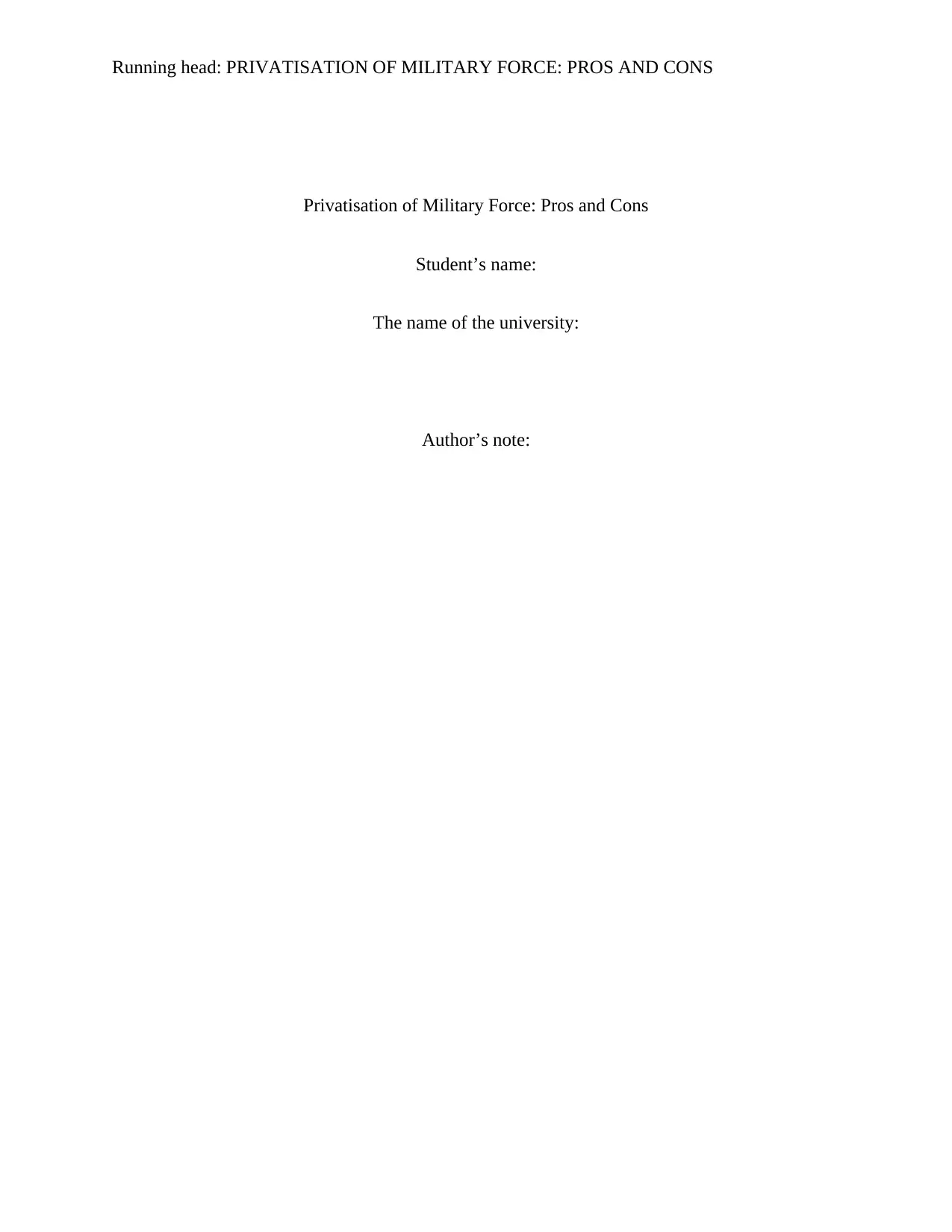
Running head: PRIVATISATION OF MILITARY FORCE: PROS AND CONS
Privatisation of Military Force: Pros and Cons
Student’s name:
The name of the university:
Author’s note:
Privatisation of Military Force: Pros and Cons
Student’s name:
The name of the university:
Author’s note:
Paraphrase This Document
Need a fresh take? Get an instant paraphrase of this document with our AI Paraphraser
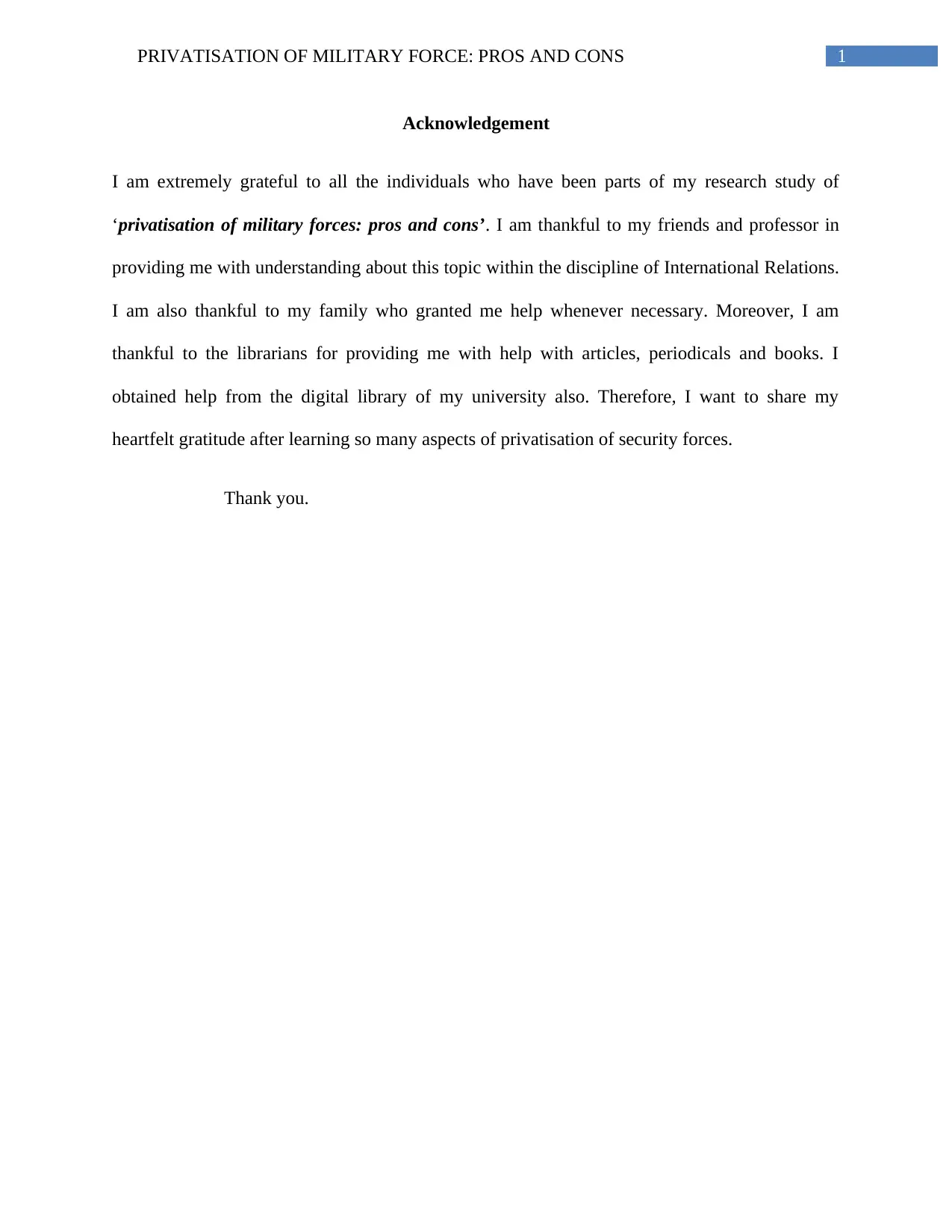
1PRIVATISATION OF MILITARY FORCE: PROS AND CONS
Acknowledgement
I am extremely grateful to all the individuals who have been parts of my research study of
‘privatisation of military forces: pros and cons’. I am thankful to my friends and professor in
providing me with understanding about this topic within the discipline of International Relations.
I am also thankful to my family who granted me help whenever necessary. Moreover, I am
thankful to the librarians for providing me with help with articles, periodicals and books. I
obtained help from the digital library of my university also. Therefore, I want to share my
heartfelt gratitude after learning so many aspects of privatisation of security forces.
Thank you.
Acknowledgement
I am extremely grateful to all the individuals who have been parts of my research study of
‘privatisation of military forces: pros and cons’. I am thankful to my friends and professor in
providing me with understanding about this topic within the discipline of International Relations.
I am also thankful to my family who granted me help whenever necessary. Moreover, I am
thankful to the librarians for providing me with help with articles, periodicals and books. I
obtained help from the digital library of my university also. Therefore, I want to share my
heartfelt gratitude after learning so many aspects of privatisation of security forces.
Thank you.
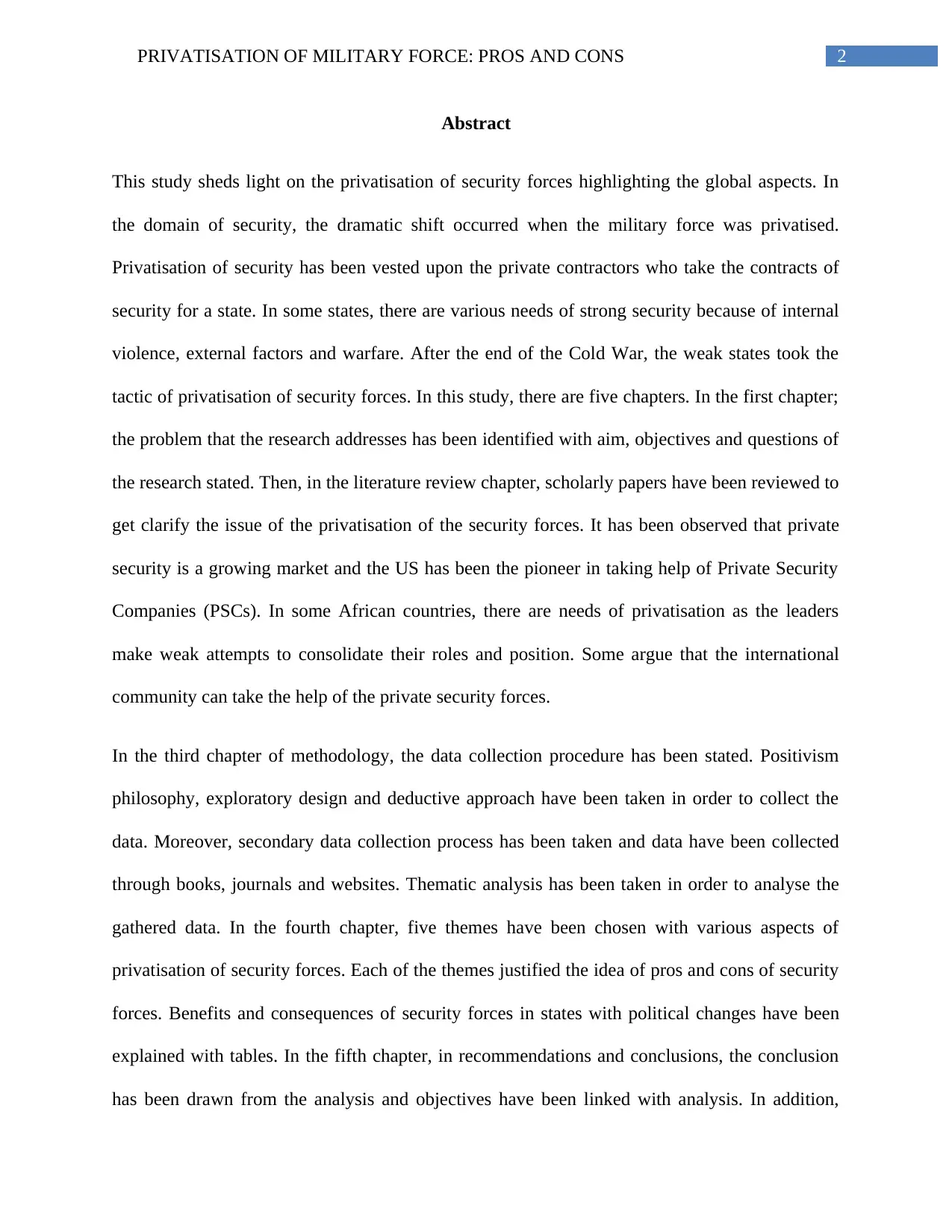
2PRIVATISATION OF MILITARY FORCE: PROS AND CONS
Abstract
This study sheds light on the privatisation of security forces highlighting the global aspects. In
the domain of security, the dramatic shift occurred when the military force was privatised.
Privatisation of security has been vested upon the private contractors who take the contracts of
security for a state. In some states, there are various needs of strong security because of internal
violence, external factors and warfare. After the end of the Cold War, the weak states took the
tactic of privatisation of security forces. In this study, there are five chapters. In the first chapter;
the problem that the research addresses has been identified with aim, objectives and questions of
the research stated. Then, in the literature review chapter, scholarly papers have been reviewed to
get clarify the issue of the privatisation of the security forces. It has been observed that private
security is a growing market and the US has been the pioneer in taking help of Private Security
Companies (PSCs). In some African countries, there are needs of privatisation as the leaders
make weak attempts to consolidate their roles and position. Some argue that the international
community can take the help of the private security forces.
In the third chapter of methodology, the data collection procedure has been stated. Positivism
philosophy, exploratory design and deductive approach have been taken in order to collect the
data. Moreover, secondary data collection process has been taken and data have been collected
through books, journals and websites. Thematic analysis has been taken in order to analyse the
gathered data. In the fourth chapter, five themes have been chosen with various aspects of
privatisation of security forces. Each of the themes justified the idea of pros and cons of security
forces. Benefits and consequences of security forces in states with political changes have been
explained with tables. In the fifth chapter, in recommendations and conclusions, the conclusion
has been drawn from the analysis and objectives have been linked with analysis. In addition,
Abstract
This study sheds light on the privatisation of security forces highlighting the global aspects. In
the domain of security, the dramatic shift occurred when the military force was privatised.
Privatisation of security has been vested upon the private contractors who take the contracts of
security for a state. In some states, there are various needs of strong security because of internal
violence, external factors and warfare. After the end of the Cold War, the weak states took the
tactic of privatisation of security forces. In this study, there are five chapters. In the first chapter;
the problem that the research addresses has been identified with aim, objectives and questions of
the research stated. Then, in the literature review chapter, scholarly papers have been reviewed to
get clarify the issue of the privatisation of the security forces. It has been observed that private
security is a growing market and the US has been the pioneer in taking help of Private Security
Companies (PSCs). In some African countries, there are needs of privatisation as the leaders
make weak attempts to consolidate their roles and position. Some argue that the international
community can take the help of the private security forces.
In the third chapter of methodology, the data collection procedure has been stated. Positivism
philosophy, exploratory design and deductive approach have been taken in order to collect the
data. Moreover, secondary data collection process has been taken and data have been collected
through books, journals and websites. Thematic analysis has been taken in order to analyse the
gathered data. In the fourth chapter, five themes have been chosen with various aspects of
privatisation of security forces. Each of the themes justified the idea of pros and cons of security
forces. Benefits and consequences of security forces in states with political changes have been
explained with tables. In the fifth chapter, in recommendations and conclusions, the conclusion
has been drawn from the analysis and objectives have been linked with analysis. In addition,
⊘ This is a preview!⊘
Do you want full access?
Subscribe today to unlock all pages.

Trusted by 1+ million students worldwide
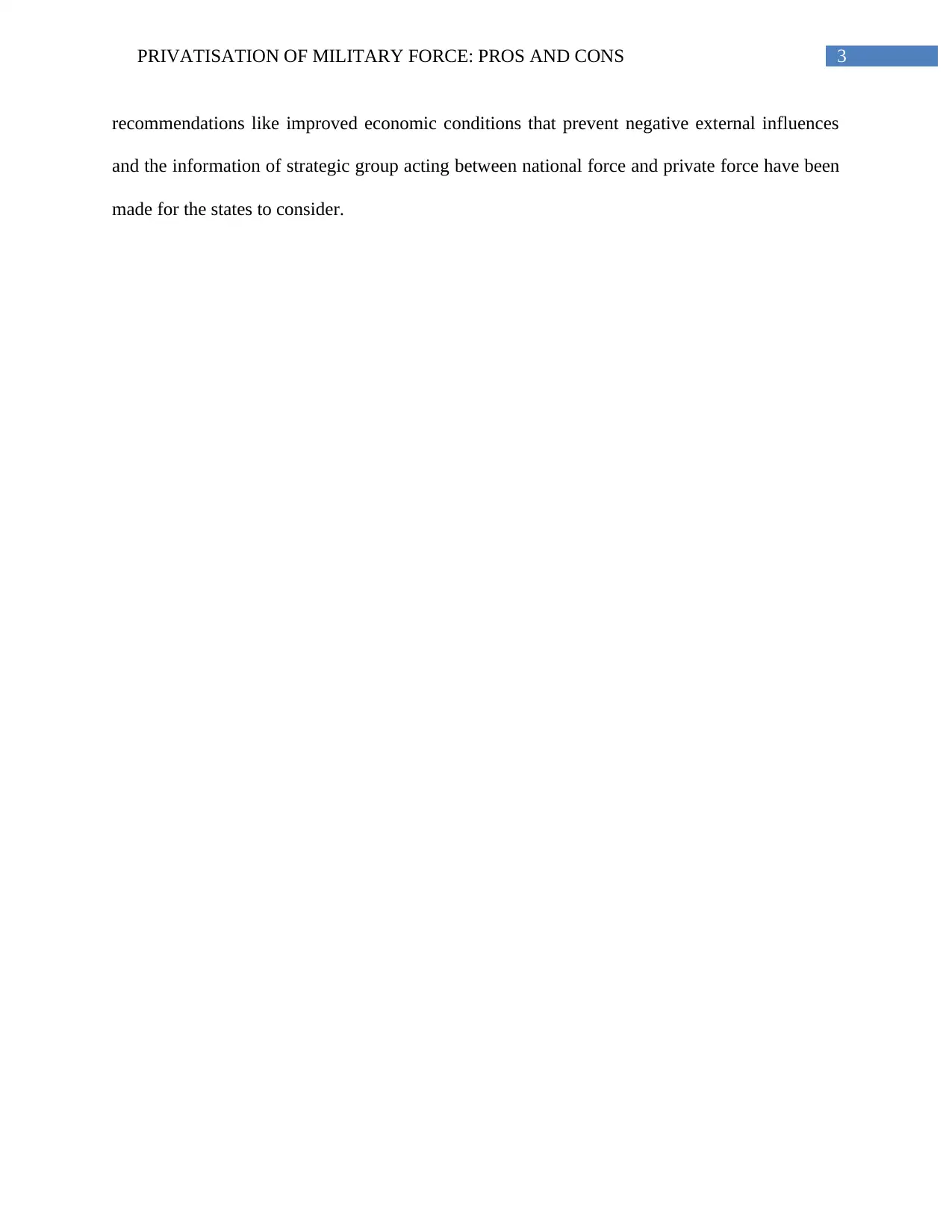
3PRIVATISATION OF MILITARY FORCE: PROS AND CONS
recommendations like improved economic conditions that prevent negative external influences
and the information of strategic group acting between national force and private force have been
made for the states to consider.
recommendations like improved economic conditions that prevent negative external influences
and the information of strategic group acting between national force and private force have been
made for the states to consider.
Paraphrase This Document
Need a fresh take? Get an instant paraphrase of this document with our AI Paraphraser
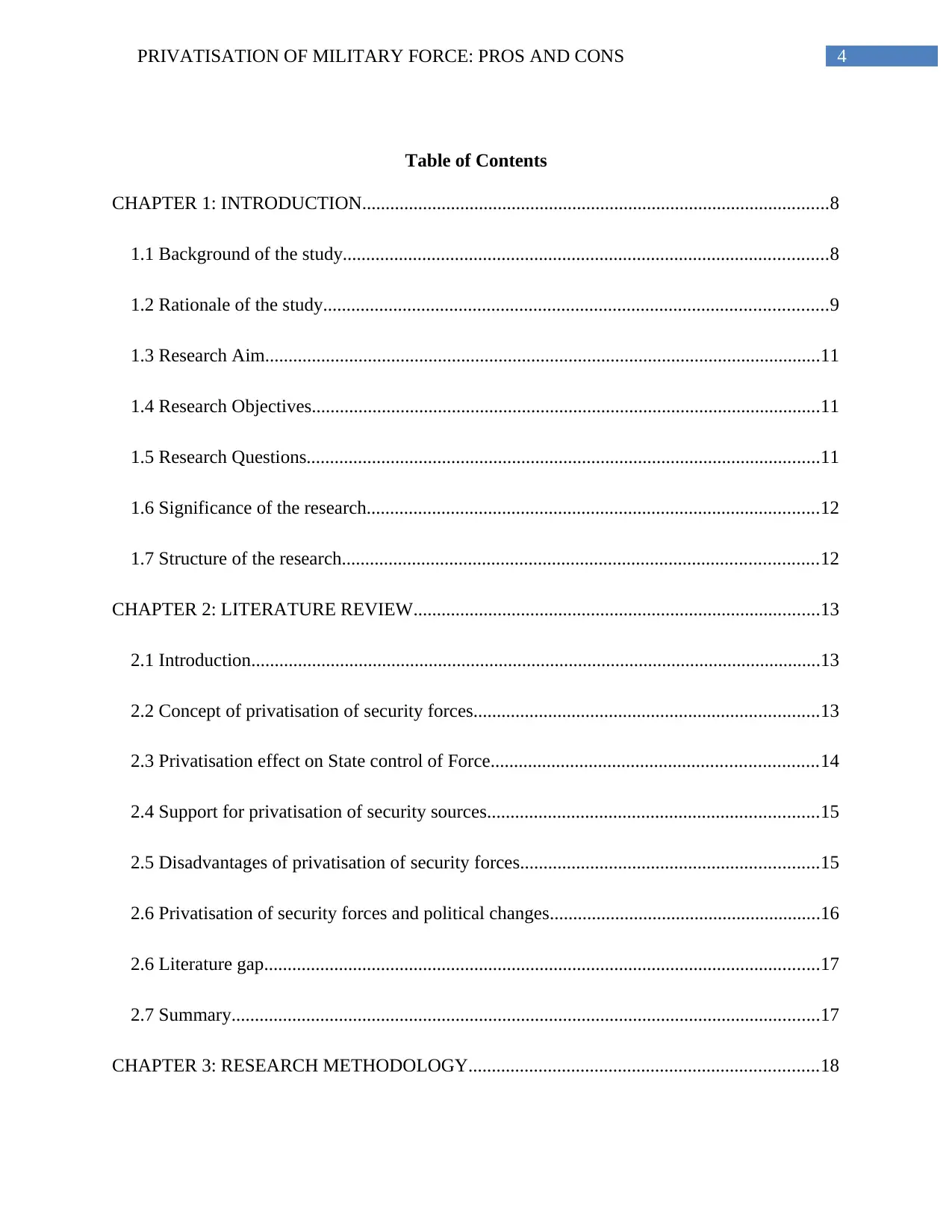
4PRIVATISATION OF MILITARY FORCE: PROS AND CONS
Table of Contents
CHAPTER 1: INTRODUCTION....................................................................................................8
1.1 Background of the study........................................................................................................8
1.2 Rationale of the study............................................................................................................9
1.3 Research Aim.......................................................................................................................11
1.4 Research Objectives.............................................................................................................11
1.5 Research Questions..............................................................................................................11
1.6 Significance of the research.................................................................................................12
1.7 Structure of the research......................................................................................................12
CHAPTER 2: LITERATURE REVIEW.......................................................................................13
2.1 Introduction..........................................................................................................................13
2.2 Concept of privatisation of security forces..........................................................................13
2.3 Privatisation effect on State control of Force......................................................................14
2.4 Support for privatisation of security sources.......................................................................15
2.5 Disadvantages of privatisation of security forces................................................................15
2.6 Privatisation of security forces and political changes..........................................................16
2.6 Literature gap.......................................................................................................................17
2.7 Summary..............................................................................................................................17
CHAPTER 3: RESEARCH METHODOLOGY...........................................................................18
Table of Contents
CHAPTER 1: INTRODUCTION....................................................................................................8
1.1 Background of the study........................................................................................................8
1.2 Rationale of the study............................................................................................................9
1.3 Research Aim.......................................................................................................................11
1.4 Research Objectives.............................................................................................................11
1.5 Research Questions..............................................................................................................11
1.6 Significance of the research.................................................................................................12
1.7 Structure of the research......................................................................................................12
CHAPTER 2: LITERATURE REVIEW.......................................................................................13
2.1 Introduction..........................................................................................................................13
2.2 Concept of privatisation of security forces..........................................................................13
2.3 Privatisation effect on State control of Force......................................................................14
2.4 Support for privatisation of security sources.......................................................................15
2.5 Disadvantages of privatisation of security forces................................................................15
2.6 Privatisation of security forces and political changes..........................................................16
2.6 Literature gap.......................................................................................................................17
2.7 Summary..............................................................................................................................17
CHAPTER 3: RESEARCH METHODOLOGY...........................................................................18
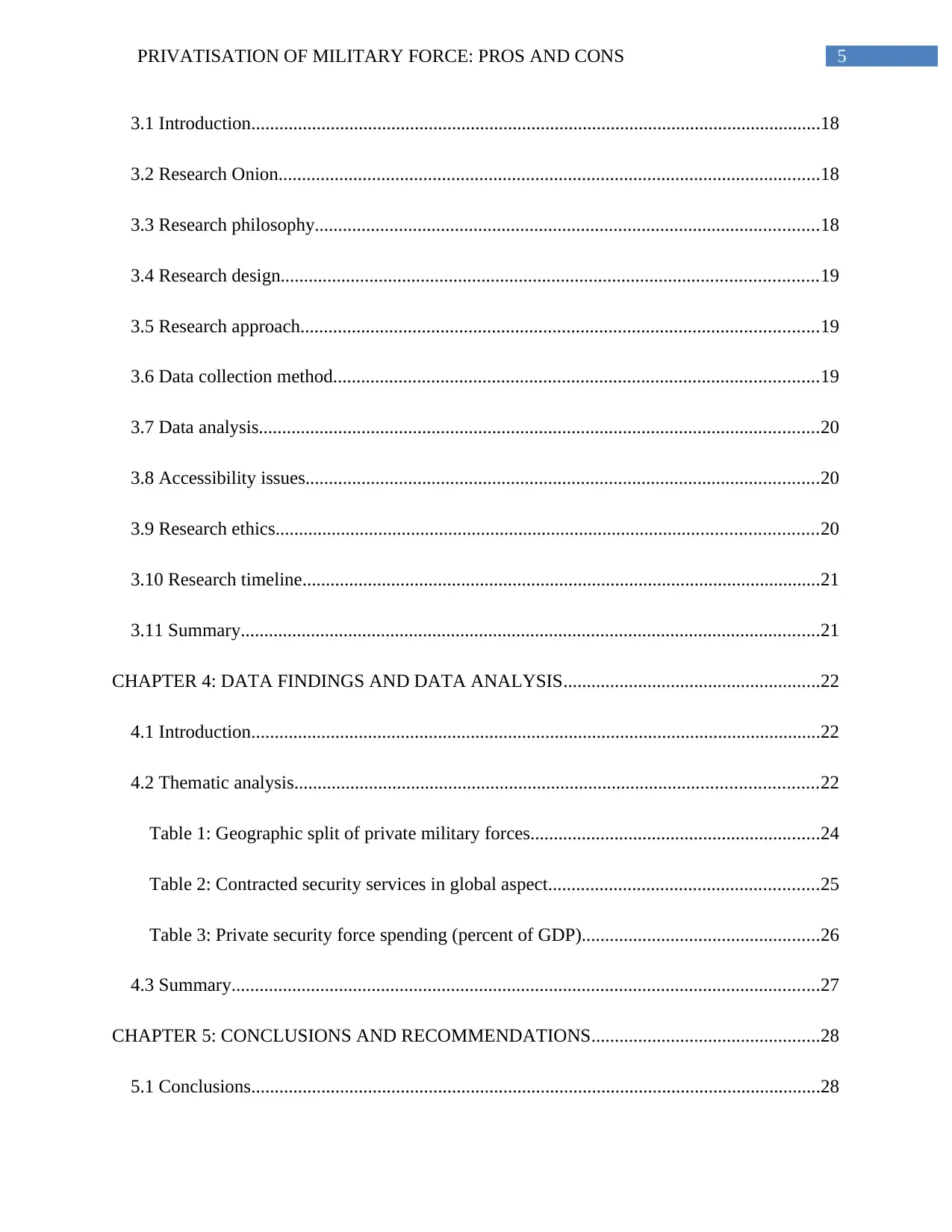
5PRIVATISATION OF MILITARY FORCE: PROS AND CONS
3.1 Introduction..........................................................................................................................18
3.2 Research Onion....................................................................................................................18
3.3 Research philosophy............................................................................................................18
3.4 Research design...................................................................................................................19
3.5 Research approach...............................................................................................................19
3.6 Data collection method........................................................................................................19
3.7 Data analysis........................................................................................................................20
3.8 Accessibility issues..............................................................................................................20
3.9 Research ethics....................................................................................................................20
3.10 Research timeline...............................................................................................................21
3.11 Summary............................................................................................................................21
CHAPTER 4: DATA FINDINGS AND DATA ANALYSIS.......................................................22
4.1 Introduction..........................................................................................................................22
4.2 Thematic analysis................................................................................................................22
Table 1: Geographic split of private military forces..............................................................24
Table 2: Contracted security services in global aspect..........................................................25
Table 3: Private security force spending (percent of GDP)...................................................26
4.3 Summary..............................................................................................................................27
CHAPTER 5: CONCLUSIONS AND RECOMMENDATIONS.................................................28
5.1 Conclusions..........................................................................................................................28
3.1 Introduction..........................................................................................................................18
3.2 Research Onion....................................................................................................................18
3.3 Research philosophy............................................................................................................18
3.4 Research design...................................................................................................................19
3.5 Research approach...............................................................................................................19
3.6 Data collection method........................................................................................................19
3.7 Data analysis........................................................................................................................20
3.8 Accessibility issues..............................................................................................................20
3.9 Research ethics....................................................................................................................20
3.10 Research timeline...............................................................................................................21
3.11 Summary............................................................................................................................21
CHAPTER 4: DATA FINDINGS AND DATA ANALYSIS.......................................................22
4.1 Introduction..........................................................................................................................22
4.2 Thematic analysis................................................................................................................22
Table 1: Geographic split of private military forces..............................................................24
Table 2: Contracted security services in global aspect..........................................................25
Table 3: Private security force spending (percent of GDP)...................................................26
4.3 Summary..............................................................................................................................27
CHAPTER 5: CONCLUSIONS AND RECOMMENDATIONS.................................................28
5.1 Conclusions..........................................................................................................................28
⊘ This is a preview!⊘
Do you want full access?
Subscribe today to unlock all pages.

Trusted by 1+ million students worldwide
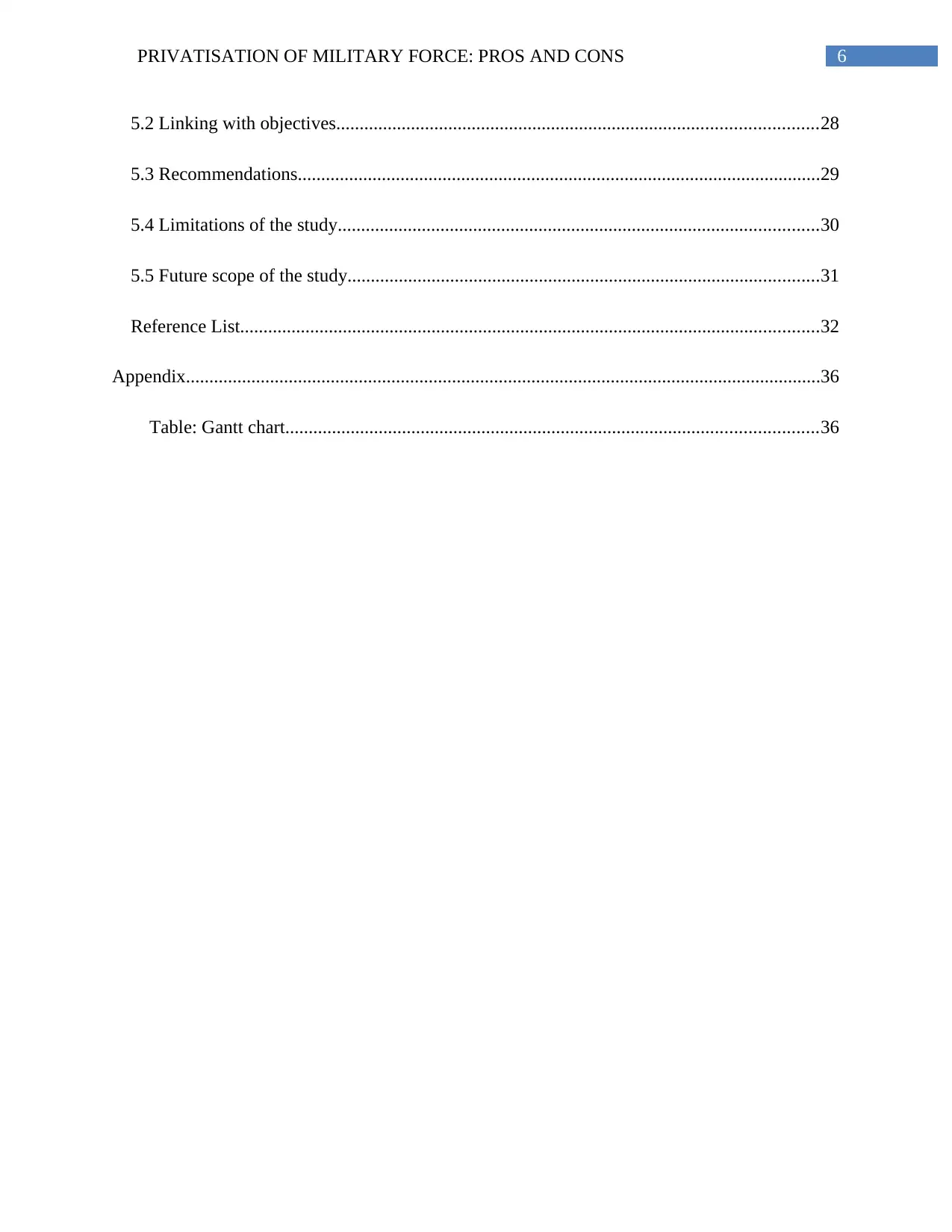
6PRIVATISATION OF MILITARY FORCE: PROS AND CONS
5.2 Linking with objectives.......................................................................................................28
5.3 Recommendations................................................................................................................29
5.4 Limitations of the study.......................................................................................................30
5.5 Future scope of the study.....................................................................................................31
Reference List............................................................................................................................32
Appendix........................................................................................................................................36
Table: Gantt chart..................................................................................................................36
5.2 Linking with objectives.......................................................................................................28
5.3 Recommendations................................................................................................................29
5.4 Limitations of the study.......................................................................................................30
5.5 Future scope of the study.....................................................................................................31
Reference List............................................................................................................................32
Appendix........................................................................................................................................36
Table: Gantt chart..................................................................................................................36
Paraphrase This Document
Need a fresh take? Get an instant paraphrase of this document with our AI Paraphraser
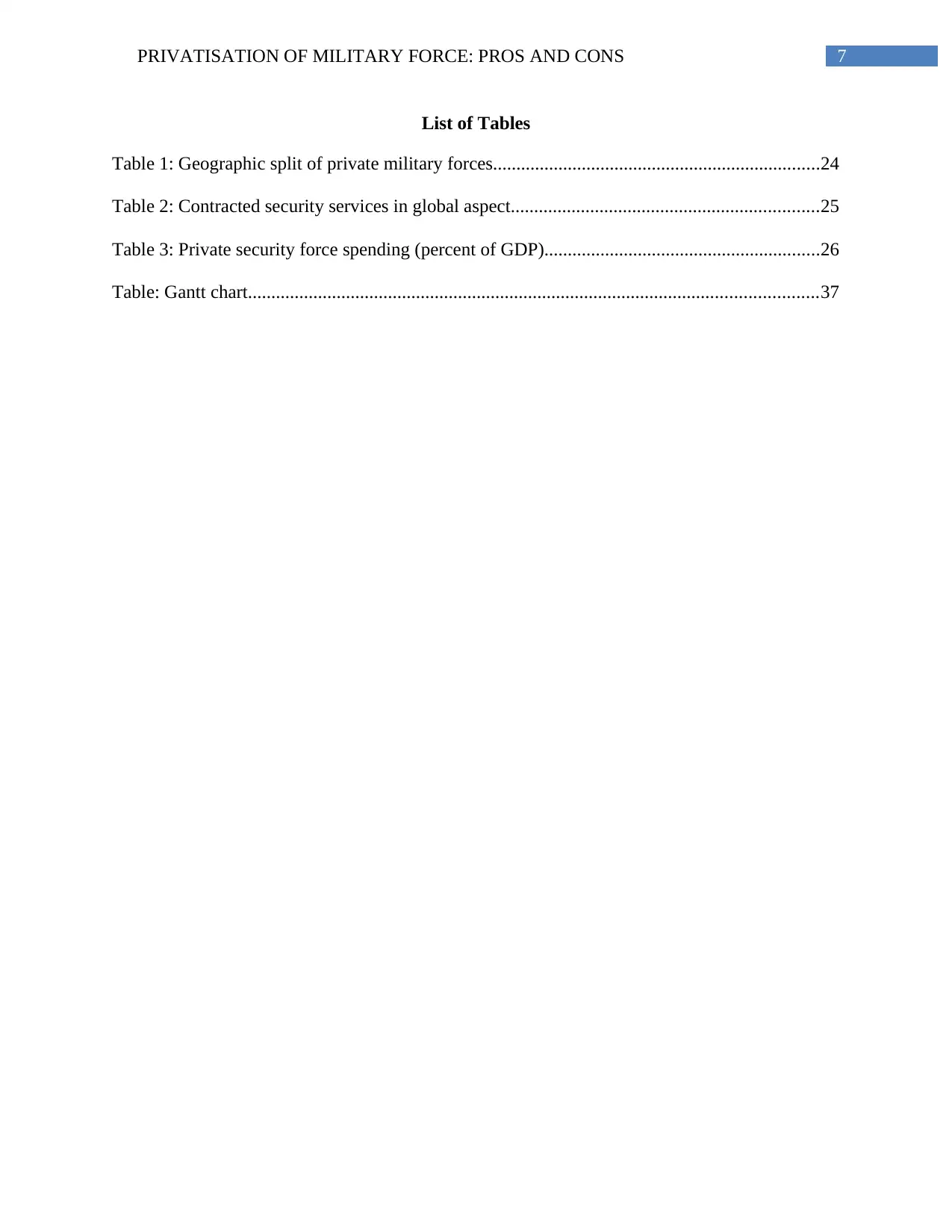
7PRIVATISATION OF MILITARY FORCE: PROS AND CONS
List of Tables
Table 1: Geographic split of private military forces......................................................................24
Table 2: Contracted security services in global aspect..................................................................25
Table 3: Private security force spending (percent of GDP)...........................................................26
Table: Gantt chart..........................................................................................................................37
List of Tables
Table 1: Geographic split of private military forces......................................................................24
Table 2: Contracted security services in global aspect..................................................................25
Table 3: Private security force spending (percent of GDP)...........................................................26
Table: Gantt chart..........................................................................................................................37
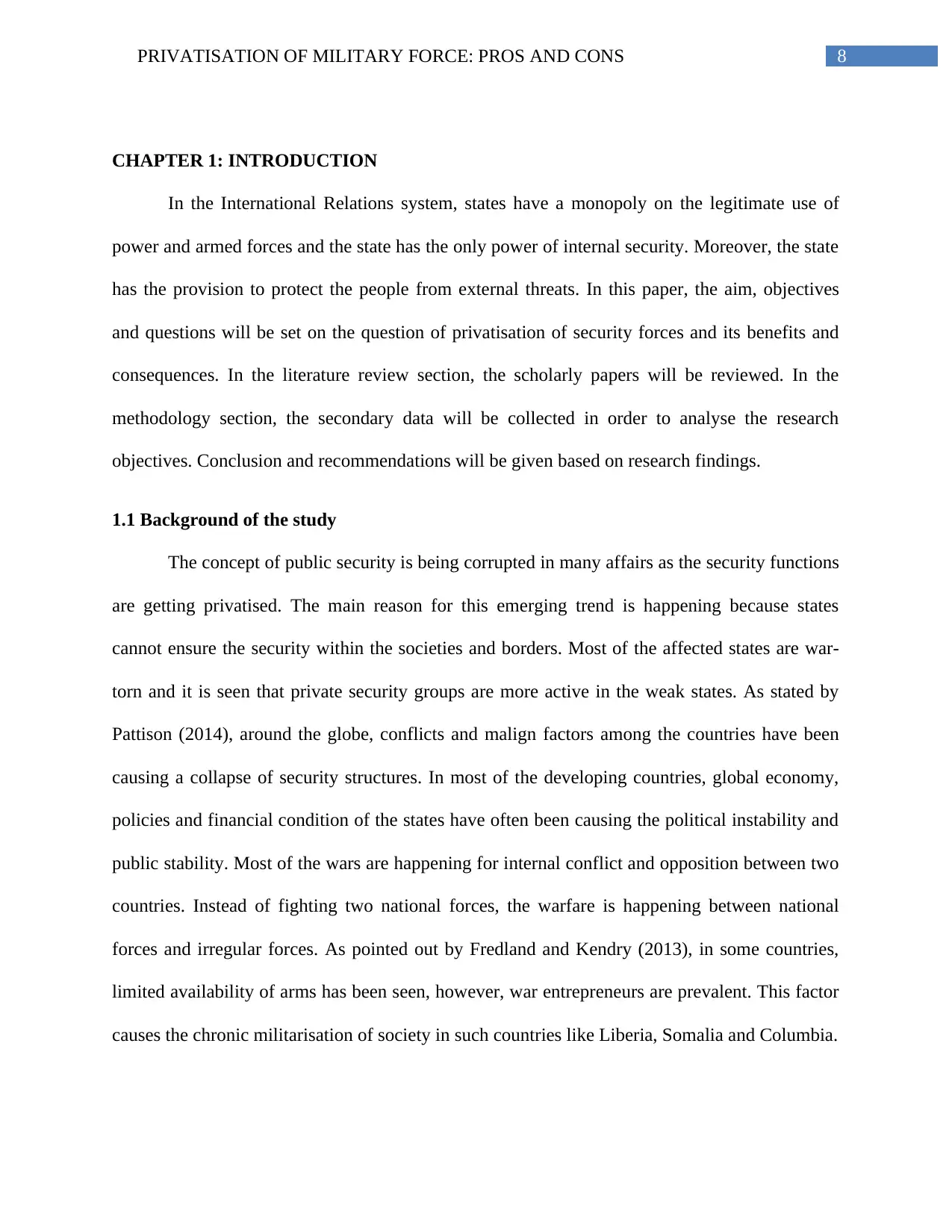
8PRIVATISATION OF MILITARY FORCE: PROS AND CONS
CHAPTER 1: INTRODUCTION
In the International Relations system, states have a monopoly on the legitimate use of
power and armed forces and the state has the only power of internal security. Moreover, the state
has the provision to protect the people from external threats. In this paper, the aim, objectives
and questions will be set on the question of privatisation of security forces and its benefits and
consequences. In the literature review section, the scholarly papers will be reviewed. In the
methodology section, the secondary data will be collected in order to analyse the research
objectives. Conclusion and recommendations will be given based on research findings.
1.1 Background of the study
The concept of public security is being corrupted in many affairs as the security functions
are getting privatised. The main reason for this emerging trend is happening because states
cannot ensure the security within the societies and borders. Most of the affected states are war-
torn and it is seen that private security groups are more active in the weak states. As stated by
Pattison (2014), around the globe, conflicts and malign factors among the countries have been
causing a collapse of security structures. In most of the developing countries, global economy,
policies and financial condition of the states have often been causing the political instability and
public stability. Most of the wars are happening for internal conflict and opposition between two
countries. Instead of fighting two national forces, the warfare is happening between national
forces and irregular forces. As pointed out by Fredland and Kendry (2013), in some countries,
limited availability of arms has been seen, however, war entrepreneurs are prevalent. This factor
causes the chronic militarisation of society in such countries like Liberia, Somalia and Columbia.
CHAPTER 1: INTRODUCTION
In the International Relations system, states have a monopoly on the legitimate use of
power and armed forces and the state has the only power of internal security. Moreover, the state
has the provision to protect the people from external threats. In this paper, the aim, objectives
and questions will be set on the question of privatisation of security forces and its benefits and
consequences. In the literature review section, the scholarly papers will be reviewed. In the
methodology section, the secondary data will be collected in order to analyse the research
objectives. Conclusion and recommendations will be given based on research findings.
1.1 Background of the study
The concept of public security is being corrupted in many affairs as the security functions
are getting privatised. The main reason for this emerging trend is happening because states
cannot ensure the security within the societies and borders. Most of the affected states are war-
torn and it is seen that private security groups are more active in the weak states. As stated by
Pattison (2014), around the globe, conflicts and malign factors among the countries have been
causing a collapse of security structures. In most of the developing countries, global economy,
policies and financial condition of the states have often been causing the political instability and
public stability. Most of the wars are happening for internal conflict and opposition between two
countries. Instead of fighting two national forces, the warfare is happening between national
forces and irregular forces. As pointed out by Fredland and Kendry (2013), in some countries,
limited availability of arms has been seen, however, war entrepreneurs are prevalent. This factor
causes the chronic militarisation of society in such countries like Liberia, Somalia and Columbia.
⊘ This is a preview!⊘
Do you want full access?
Subscribe today to unlock all pages.

Trusted by 1+ million students worldwide
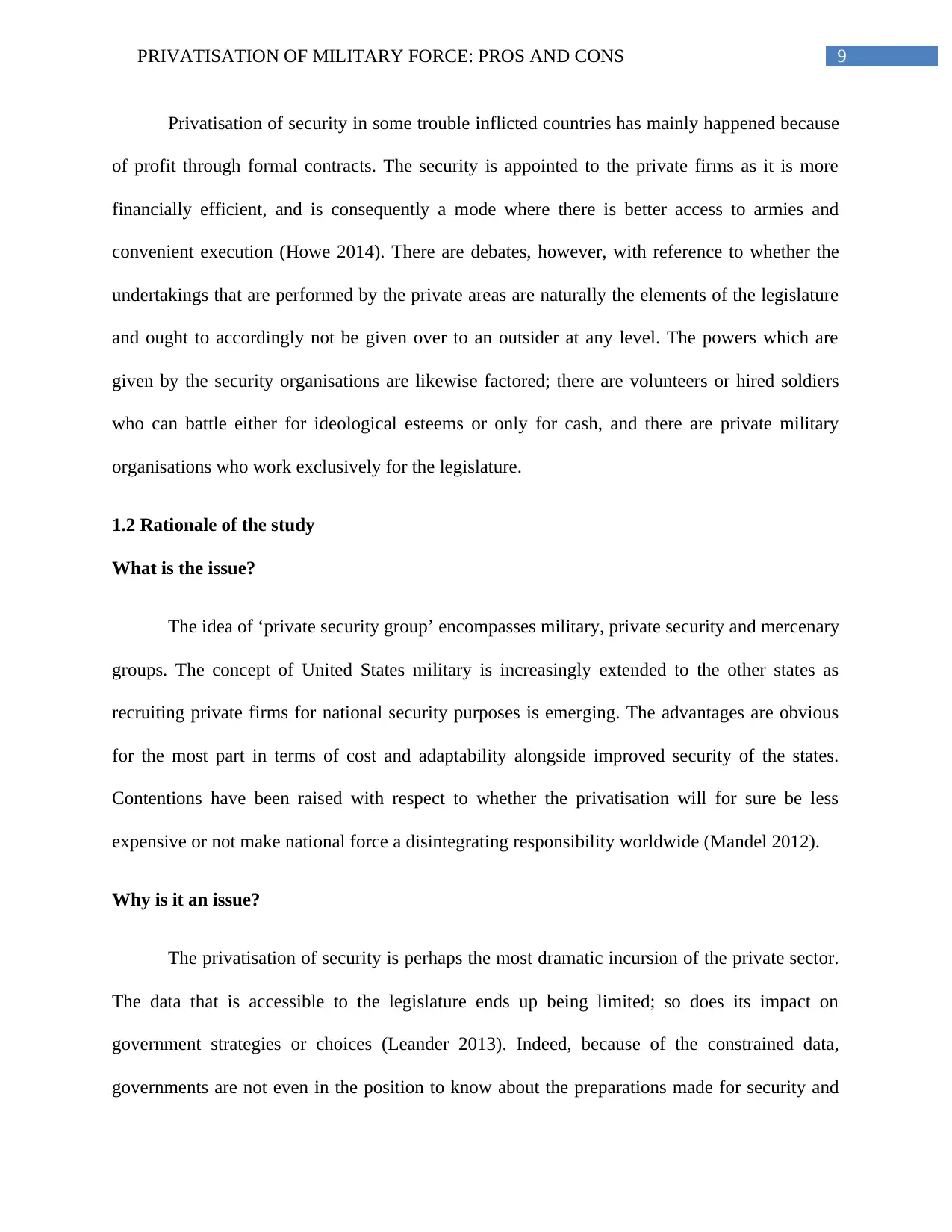
9PRIVATISATION OF MILITARY FORCE: PROS AND CONS
Privatisation of security in some trouble inflicted countries has mainly happened because
of profit through formal contracts. The security is appointed to the private firms as it is more
financially efficient, and is consequently a mode where there is better access to armies and
convenient execution (Howe 2014). There are debates, however, with reference to whether the
undertakings that are performed by the private areas are naturally the elements of the legislature
and ought to accordingly not be given over to an outsider at any level. The powers which are
given by the security organisations are likewise factored; there are volunteers or hired soldiers
who can battle either for ideological esteems or only for cash, and there are private military
organisations who work exclusively for the legislature.
1.2 Rationale of the study
What is the issue?
The idea of ‘private security group’ encompasses military, private security and mercenary
groups. The concept of United States military is increasingly extended to the other states as
recruiting private firms for national security purposes is emerging. The advantages are obvious
for the most part in terms of cost and adaptability alongside improved security of the states.
Contentions have been raised with respect to whether the privatisation will for sure be less
expensive or not make national force a disintegrating responsibility worldwide (Mandel 2012).
Why is it an issue?
The privatisation of security is perhaps the most dramatic incursion of the private sector.
The data that is accessible to the legislature ends up being limited; so does its impact on
government strategies or choices (Leander 2013). Indeed, because of the constrained data,
governments are not even in the position to know about the preparations made for security and
Privatisation of security in some trouble inflicted countries has mainly happened because
of profit through formal contracts. The security is appointed to the private firms as it is more
financially efficient, and is consequently a mode where there is better access to armies and
convenient execution (Howe 2014). There are debates, however, with reference to whether the
undertakings that are performed by the private areas are naturally the elements of the legislature
and ought to accordingly not be given over to an outsider at any level. The powers which are
given by the security organisations are likewise factored; there are volunteers or hired soldiers
who can battle either for ideological esteems or only for cash, and there are private military
organisations who work exclusively for the legislature.
1.2 Rationale of the study
What is the issue?
The idea of ‘private security group’ encompasses military, private security and mercenary
groups. The concept of United States military is increasingly extended to the other states as
recruiting private firms for national security purposes is emerging. The advantages are obvious
for the most part in terms of cost and adaptability alongside improved security of the states.
Contentions have been raised with respect to whether the privatisation will for sure be less
expensive or not make national force a disintegrating responsibility worldwide (Mandel 2012).
Why is it an issue?
The privatisation of security is perhaps the most dramatic incursion of the private sector.
The data that is accessible to the legislature ends up being limited; so does its impact on
government strategies or choices (Leander 2013). Indeed, because of the constrained data,
governments are not even in the position to know about the preparations made for security and
Paraphrase This Document
Need a fresh take? Get an instant paraphrase of this document with our AI Paraphraser
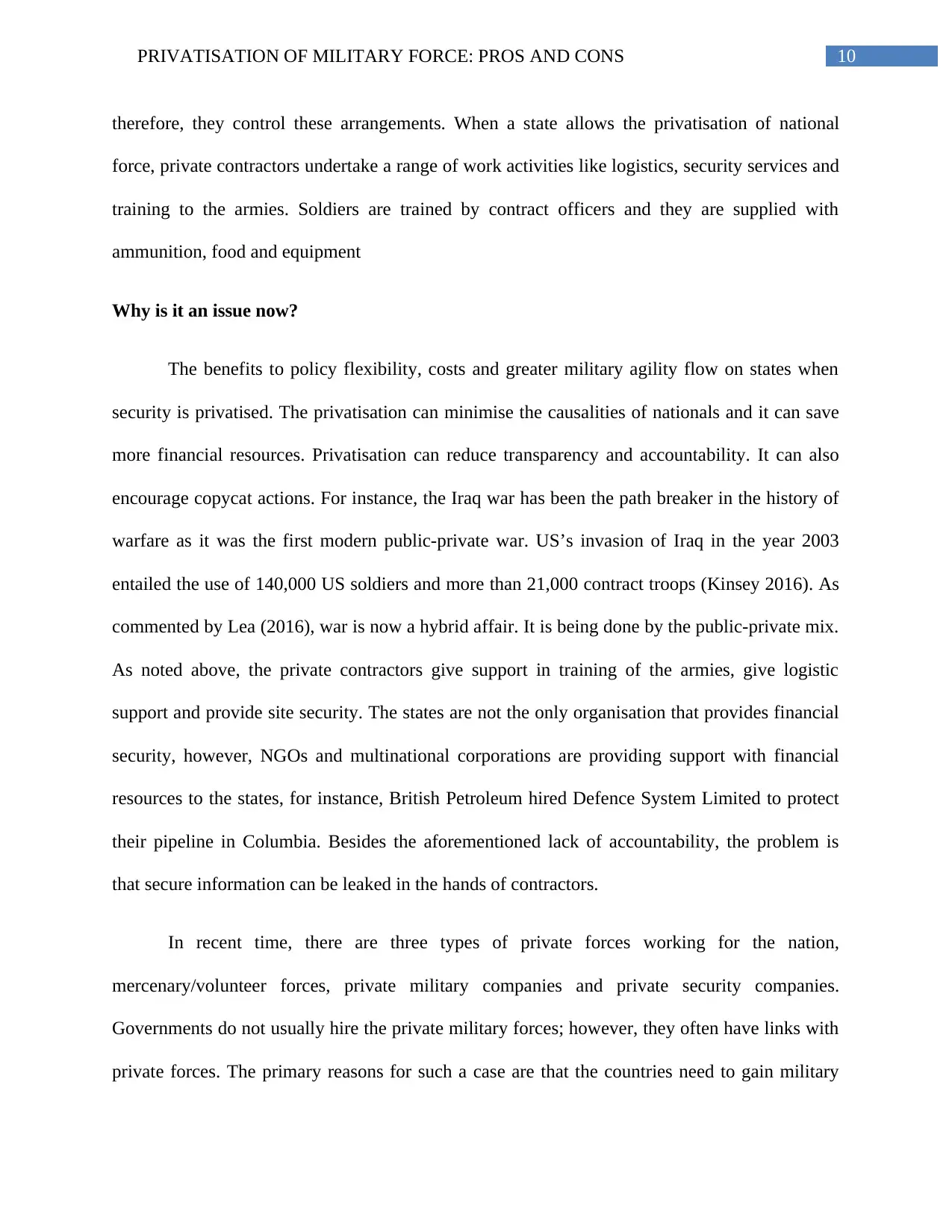
10PRIVATISATION OF MILITARY FORCE: PROS AND CONS
therefore, they control these arrangements. When a state allows the privatisation of national
force, private contractors undertake a range of work activities like logistics, security services and
training to the armies. Soldiers are trained by contract officers and they are supplied with
ammunition, food and equipment
Why is it an issue now?
The benefits to policy flexibility, costs and greater military agility flow on states when
security is privatised. The privatisation can minimise the causalities of nationals and it can save
more financial resources. Privatisation can reduce transparency and accountability. It can also
encourage copycat actions. For instance, the Iraq war has been the path breaker in the history of
warfare as it was the first modern public-private war. US’s invasion of Iraq in the year 2003
entailed the use of 140,000 US soldiers and more than 21,000 contract troops (Kinsey 2016). As
commented by Lea (2016), war is now a hybrid affair. It is being done by the public-private mix.
As noted above, the private contractors give support in training of the armies, give logistic
support and provide site security. The states are not the only organisation that provides financial
security, however, NGOs and multinational corporations are providing support with financial
resources to the states, for instance, British Petroleum hired Defence System Limited to protect
their pipeline in Columbia. Besides the aforementioned lack of accountability, the problem is
that secure information can be leaked in the hands of contractors.
In recent time, there are three types of private forces working for the nation,
mercenary/volunteer forces, private military companies and private security companies.
Governments do not usually hire the private military forces; however, they often have links with
private forces. The primary reasons for such a case are that the countries need to gain military
therefore, they control these arrangements. When a state allows the privatisation of national
force, private contractors undertake a range of work activities like logistics, security services and
training to the armies. Soldiers are trained by contract officers and they are supplied with
ammunition, food and equipment
Why is it an issue now?
The benefits to policy flexibility, costs and greater military agility flow on states when
security is privatised. The privatisation can minimise the causalities of nationals and it can save
more financial resources. Privatisation can reduce transparency and accountability. It can also
encourage copycat actions. For instance, the Iraq war has been the path breaker in the history of
warfare as it was the first modern public-private war. US’s invasion of Iraq in the year 2003
entailed the use of 140,000 US soldiers and more than 21,000 contract troops (Kinsey 2016). As
commented by Lea (2016), war is now a hybrid affair. It is being done by the public-private mix.
As noted above, the private contractors give support in training of the armies, give logistic
support and provide site security. The states are not the only organisation that provides financial
security, however, NGOs and multinational corporations are providing support with financial
resources to the states, for instance, British Petroleum hired Defence System Limited to protect
their pipeline in Columbia. Besides the aforementioned lack of accountability, the problem is
that secure information can be leaked in the hands of contractors.
In recent time, there are three types of private forces working for the nation,
mercenary/volunteer forces, private military companies and private security companies.
Governments do not usually hire the private military forces; however, they often have links with
private forces. The primary reasons for such a case are that the countries need to gain military
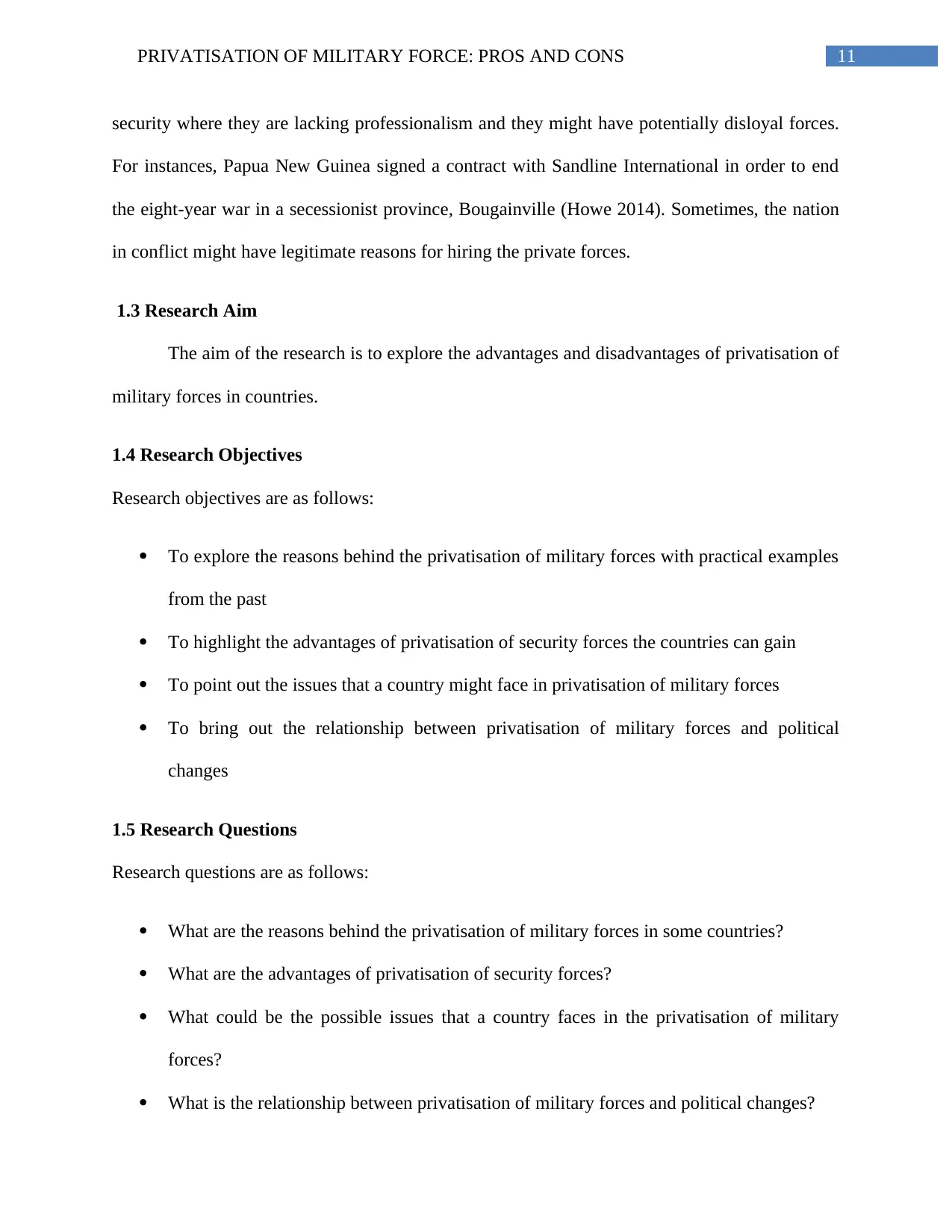
11PRIVATISATION OF MILITARY FORCE: PROS AND CONS
security where they are lacking professionalism and they might have potentially disloyal forces.
For instances, Papua New Guinea signed a contract with Sandline International in order to end
the eight-year war in a secessionist province, Bougainville (Howe 2014). Sometimes, the nation
in conflict might have legitimate reasons for hiring the private forces.
1.3 Research Aim
The aim of the research is to explore the advantages and disadvantages of privatisation of
military forces in countries.
1.4 Research Objectives
Research objectives are as follows:
To explore the reasons behind the privatisation of military forces with practical examples
from the past
To highlight the advantages of privatisation of security forces the countries can gain
To point out the issues that a country might face in privatisation of military forces
To bring out the relationship between privatisation of military forces and political
changes
1.5 Research Questions
Research questions are as follows:
What are the reasons behind the privatisation of military forces in some countries?
What are the advantages of privatisation of security forces?
What could be the possible issues that a country faces in the privatisation of military
forces?
What is the relationship between privatisation of military forces and political changes?
security where they are lacking professionalism and they might have potentially disloyal forces.
For instances, Papua New Guinea signed a contract with Sandline International in order to end
the eight-year war in a secessionist province, Bougainville (Howe 2014). Sometimes, the nation
in conflict might have legitimate reasons for hiring the private forces.
1.3 Research Aim
The aim of the research is to explore the advantages and disadvantages of privatisation of
military forces in countries.
1.4 Research Objectives
Research objectives are as follows:
To explore the reasons behind the privatisation of military forces with practical examples
from the past
To highlight the advantages of privatisation of security forces the countries can gain
To point out the issues that a country might face in privatisation of military forces
To bring out the relationship between privatisation of military forces and political
changes
1.5 Research Questions
Research questions are as follows:
What are the reasons behind the privatisation of military forces in some countries?
What are the advantages of privatisation of security forces?
What could be the possible issues that a country faces in the privatisation of military
forces?
What is the relationship between privatisation of military forces and political changes?
⊘ This is a preview!⊘
Do you want full access?
Subscribe today to unlock all pages.

Trusted by 1+ million students worldwide
1 out of 37
Related Documents
Your All-in-One AI-Powered Toolkit for Academic Success.
+13062052269
info@desklib.com
Available 24*7 on WhatsApp / Email
![[object Object]](/_next/static/media/star-bottom.7253800d.svg)
Unlock your academic potential
Copyright © 2020–2025 A2Z Services. All Rights Reserved. Developed and managed by ZUCOL.





